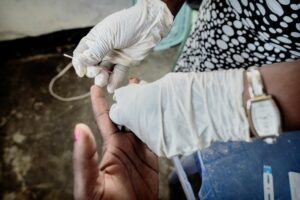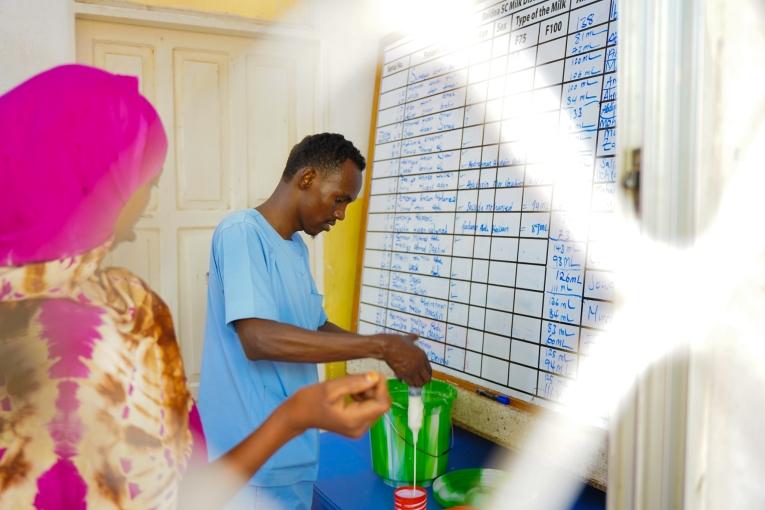Cuts to PEPFAR and USAID have also led to the suspension and closure of HIV programs in countries such as South Africa, Uganda, and Zimbabwe, putting the lives of people receiving antiretroviral (ARV) therapy at risk.
More than three months after the Trump administration suspended its international
More than three months after the Trump administration suspended its international aid funding, Médecins Sans Frontières (MSF) is witnessing the devastating impact of this abrupt halt. Patients are struggling to access treatment, healthcare workers are doing their best to maintain access to care, and humanitarian organizations are warning of a surge in needs in countries already facing crisis. The status of the few U.S.-funded programs that remain is uncertain. According to an internal State Department memo released by the media, the U.S. administration now plans to extend the initial review period of international aid by 30 days, which was originally set to end on April 20.
These cuts are part of a political agenda that is having far-reaching consequences on people whose access to care is already restricted by persecution and discrimination—such as refugees and migrants, civilians trapped in conflict, women, and LGBTQIA+ individuals.
“We are an organization specialized in emergency response, but we have never seen such disruption to global humanitarian and health programs,” said Avril Benoît, Executive Director of MSF-USA. “This entirely new and extremely dangerous situation is unacceptable. We strongly urge the administration and Congress to uphold their commitments to global health and humanitarian aid.”
Although MSF does not accept U.S. government funding and is therefore not directly affected by these radical changes, the organization works closely with other humanitarian and health partners to deliver vital services. Many of MSF’s activities are linked to health programs that have been suspended due to the budget cuts. Providing care has become increasingly difficult and costly as Ministries of Health around the world are affected, and as there are fewer partners. MSF will also face reduced options for referring patients to specialized services, along with shortages caused by paralyzed supply chains.

MSF teams are already witnessing the chaos and some of the direct consequences of the Trump administration’s decisions. Organizations that were previously funded by the U.S. have scaled down or stopped essential operations, endangering patients’ lives.
In the weeks following the suspension of U.S. funding, several organizations halted the distribution of clean drinking water to displaced people in conflict-affected areas, including Sudan’s Darfur region, Ethiopia’s Tigray region, and the Haitian capital, Port-au-Prince. In March, MSF began trucking water to supply more than 13,000 displaced people living in four camps in Port-au-Prince.
In the Baidoa and Mudug regions of Somalia, U.S. funding cuts have compounded chronic underfunding and an already dire shortage of health services, leading to a rise in cases of severe acute malnutrition, according to MSF teams in Baidoa. Bay Regional Hospital, supported by MSF, has received patients who traveled nearly 200 km to access care due to the closure of other facilities.
Reductions in PEPFAR and USAID support have also led to the suspension and shutdown of HIV programs in countries such as South Africa, Uganda, and Zimbabwe—threatening the lives of people receiving antiretroviral (ARV) therapy. In MSF’s program in San Pedro Sula, Honduras, the distribution of pre-exposure prophylaxis (PrEP) tablets rose by 70% from January to March compared to the previous quarter.
In border regions of South Sudan and Ethiopia, MSF teams are responding to a rapidly spreading cholera outbreak amid escalating violence, while other organizations have scaled back their presence due to lack of funding.
, Médecins Sans Frontières (MSF) is witnessing the devastating impact of this abrupt halt. Patients are struggling to access treatment, healthcare workers are doing their best to maintain access to care, and humanitarian organizations are warning of a surge in needs in countries already facing crisis. The status of the few U.S.-funded programs that remain is uncertain. According to an internal State Department memo released by the media, the U.S. administration now plans to extend the initial review period of international aid by 30 days, which was originally set to end on April 20.
These cuts are part of a political agenda that is having far-reaching consequences on people whose access to care is already restricted by persecution and discrimination—such as refugees and migrants, civilians trapped in conflict, women, and LGBTQIA+ individuals.
“We are an organization specialized in emergency response, but we have never seen such disruption to global humanitarian and health programs,” said Avril Benoît, Executive Director of MSF-USA. “This entirely new and extremely dangerous situation is unacceptable. We strongly urge the administration and Congress to uphold their commitments to global health and humanitarian aid.”
Although MSF does not accept U.S. government funding and is therefore not directly affected by these radical changes, the organization works closely with other humanitarian and health partners to deliver vital services. Many of MSF’s activities are linked to health programs that have been suspended due to the budget cuts. Providing care has become increasingly difficult and costly as Ministries of Health around the world are affected, and as there are fewer partners. MSF will also face reduced options for referring patients to specialized services, along with shortages caused by paralyzed supply chains.
MSF teams are already witnessing the chaos and some of the direct consequences of the Trump administration’s decisions. Organizations that were previously funded by the U.S. have scaled down or stopped essential operations, endangering patients’ lives.
In the weeks following the suspension of U.S. funding, several organizations halted the distribution of clean drinking water to displaced people in conflict-affected areas, including Sudan’s Darfur region, Ethiopia’s Tigray region, and the Haitian capital, Port-au-Prince. In March, MSF began trucking water to supply more than 13,000 displaced people living in four camps in Port-au-Prince.
In the Baidoa and Mudug regions of Somalia, U.S. funding cuts have compounded chronic underfunding and an already dire shortage of health services, leading to a rise in cases of severe acute malnutrition, according to MSF teams in Baidoa. Bay Regional Hospital, supported by MSF, has received patients who traveled nearly 200 km to access care due to the closure of other facilities.
Reductions in PEPFAR and USAID support have also led to the suspension and shutdown of HIV programs in countries such as South Africa, Uganda, and Zimbabwe—threatening the lives of people receiving antiretroviral (ARV) therapy. In MSF’s program in San Pedro Sula, Honduras, the distribution of pre-exposure prophylaxis (PrEP) tablets rose by 70% from January to March compared to the previous quarter.
In border regions of South Sudan and Ethiopia, MSF teams are responding to a rapidly spreading cholera outbreak amid escalating violence, while other organizations have scaled back their presence due to lack of funding.







OTHER ARTICLES
Strengthening pandemic prevention, preparedness, and response capacities in Senegal using the “One Health” approach
Africa Health Brief
Sex, Gender, and Medicine: Understanding Errors in Sex Assignment